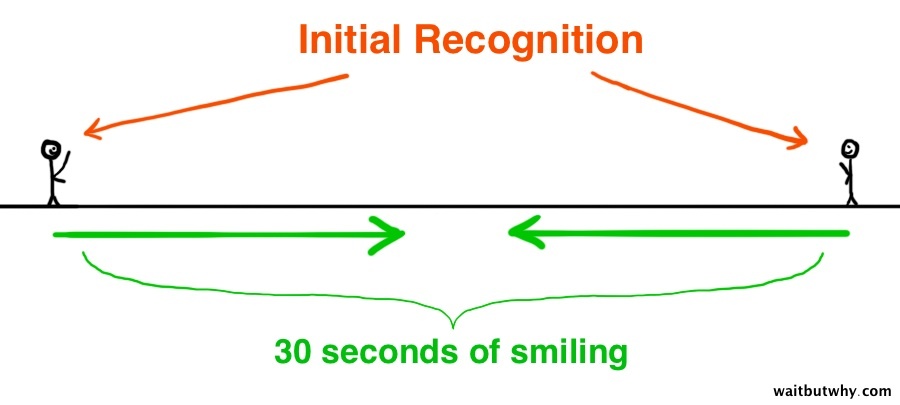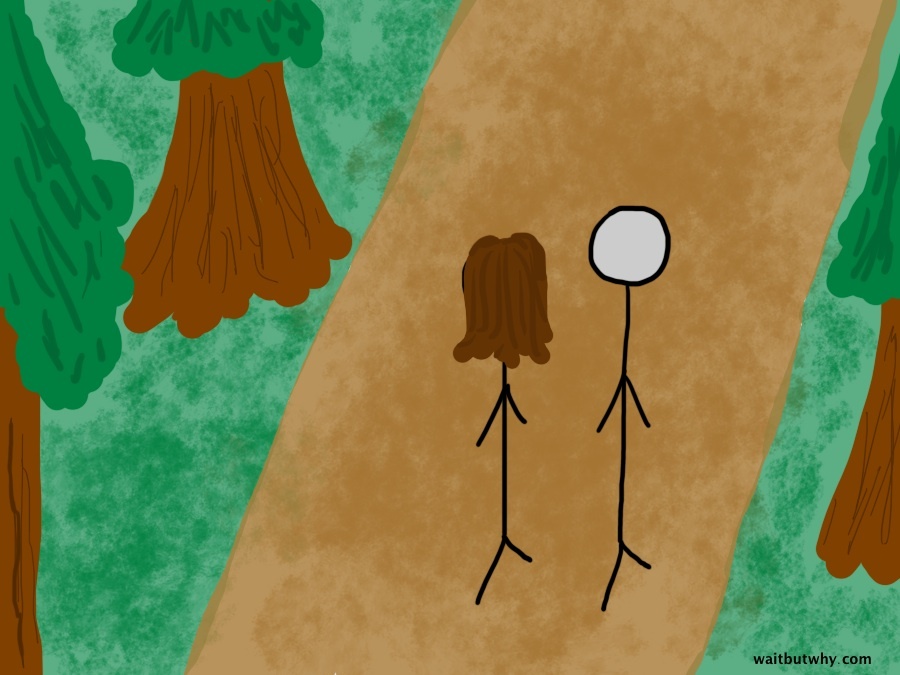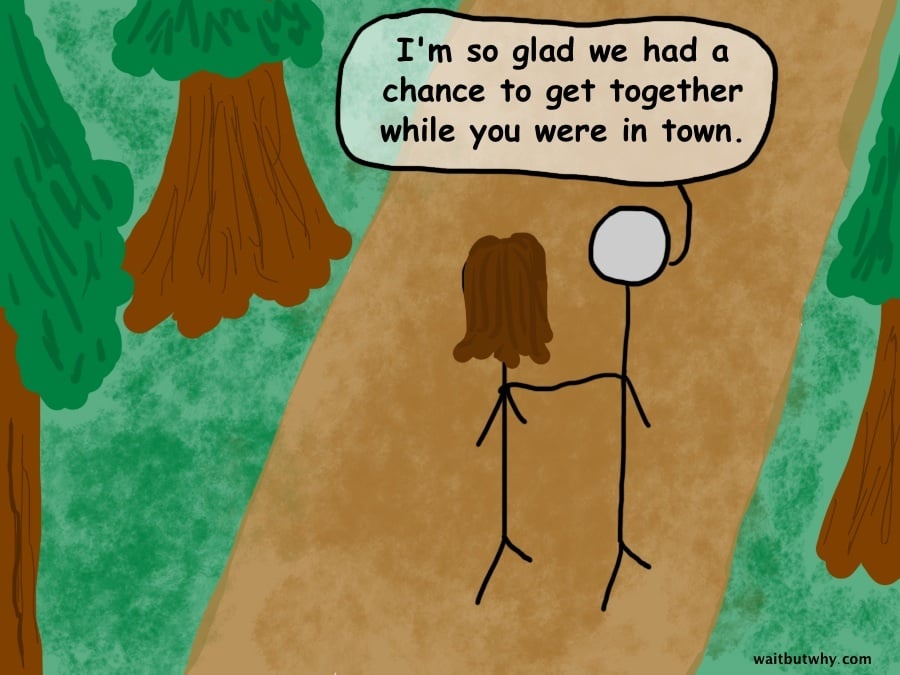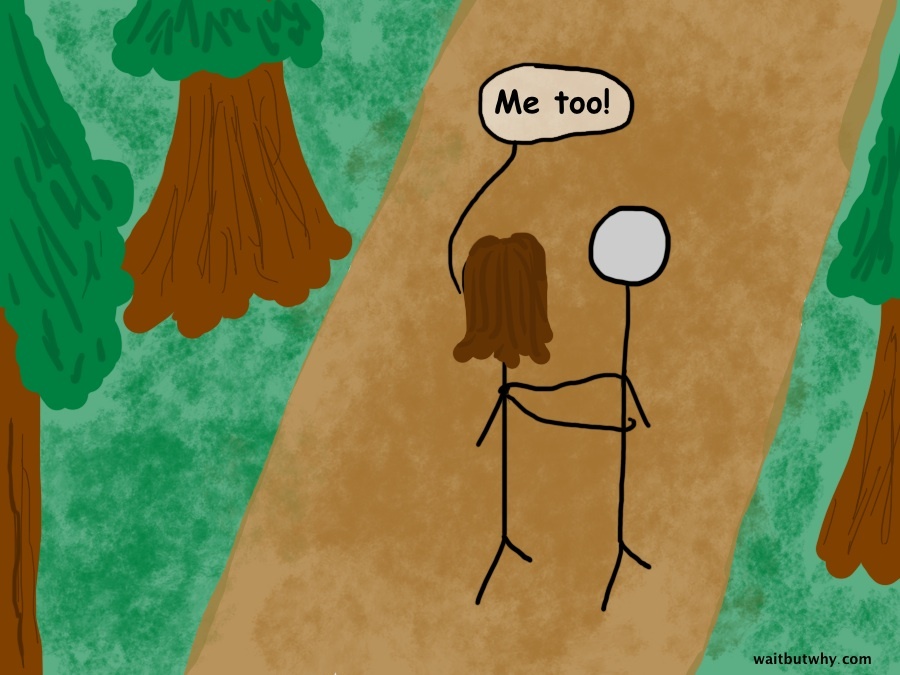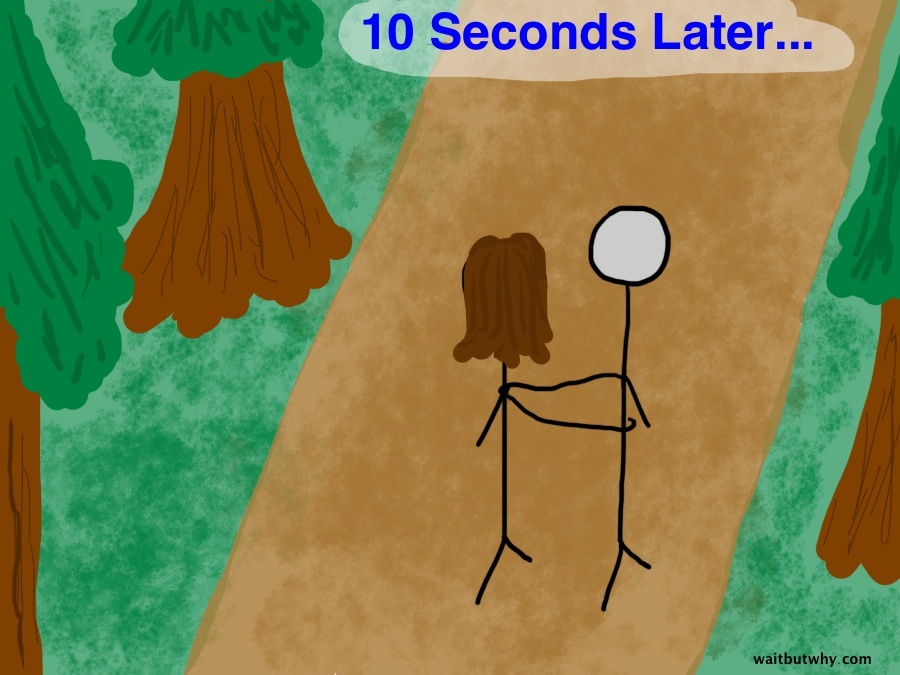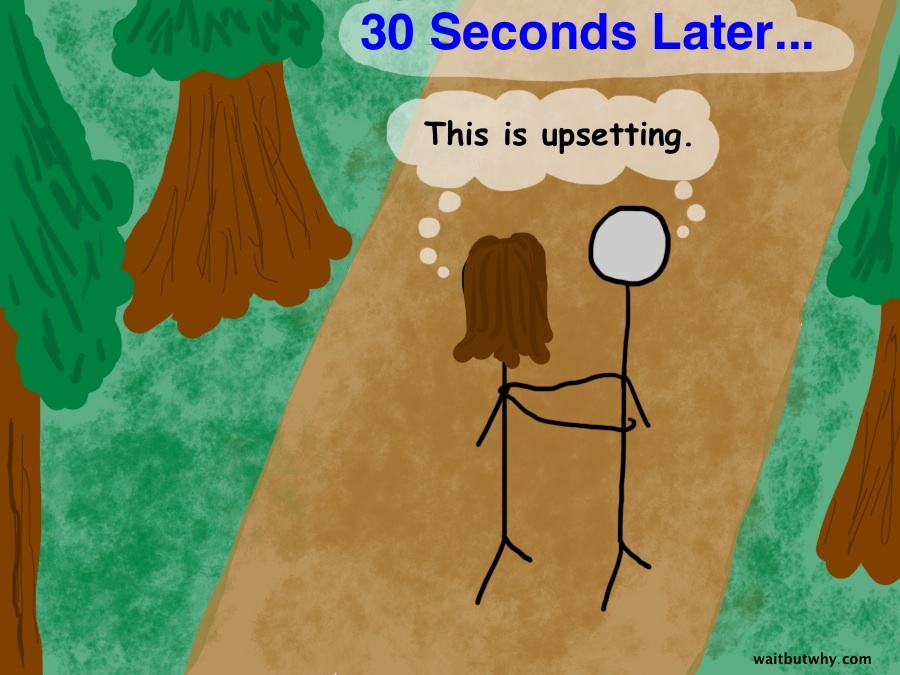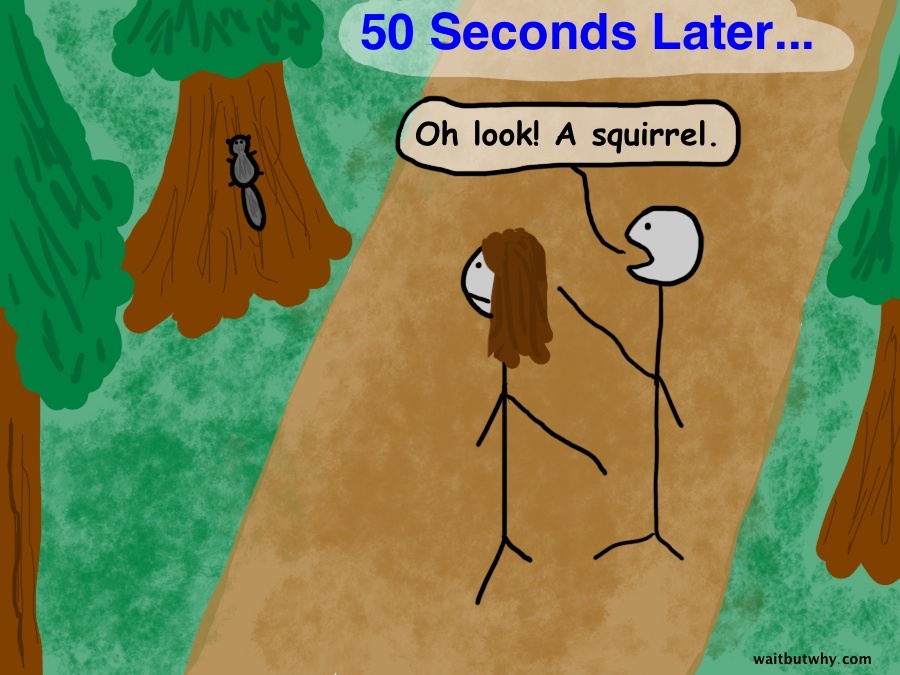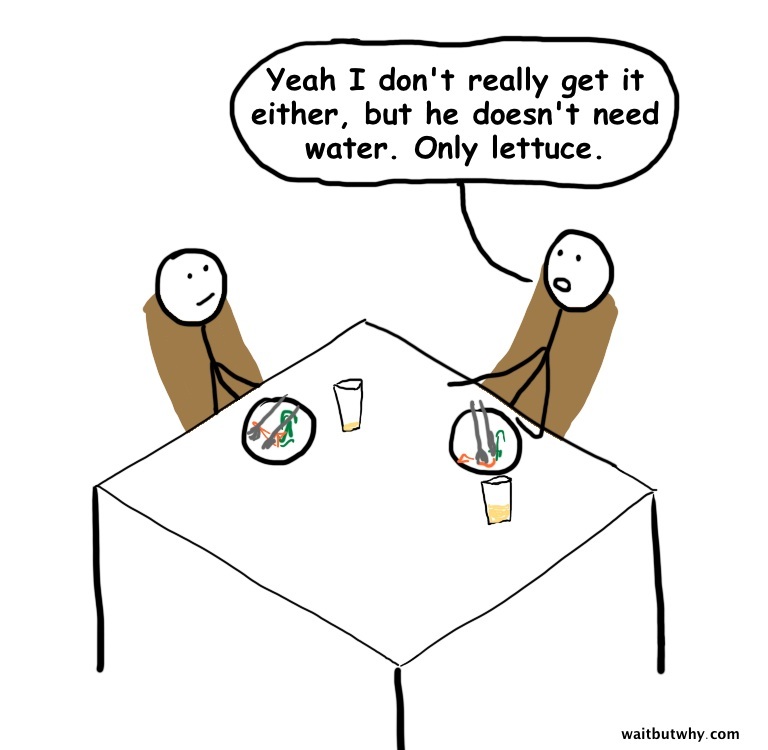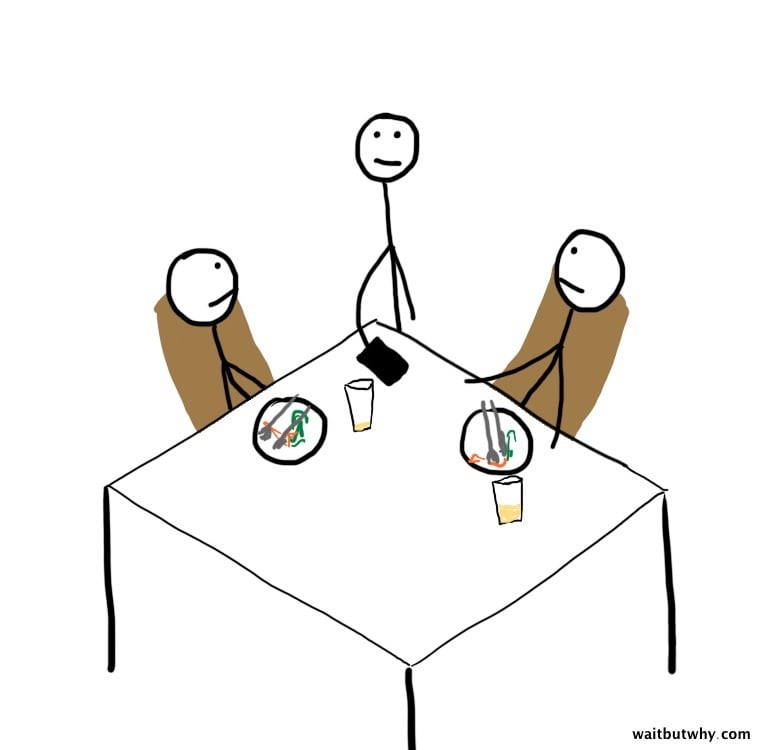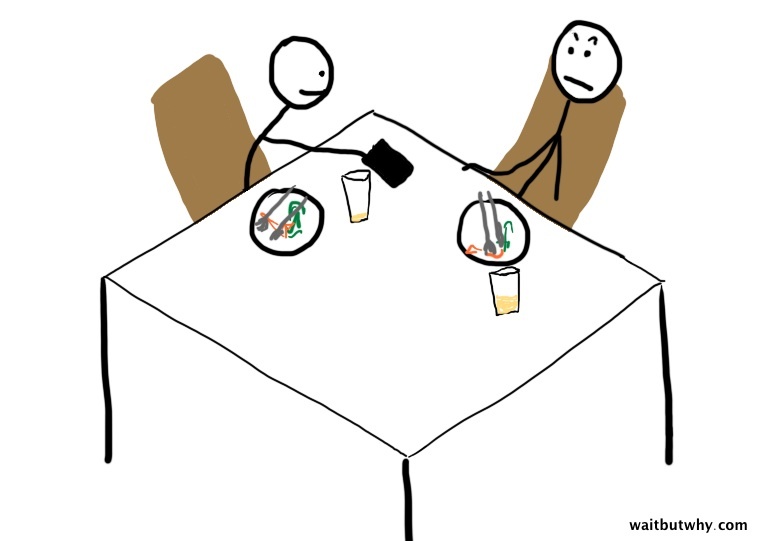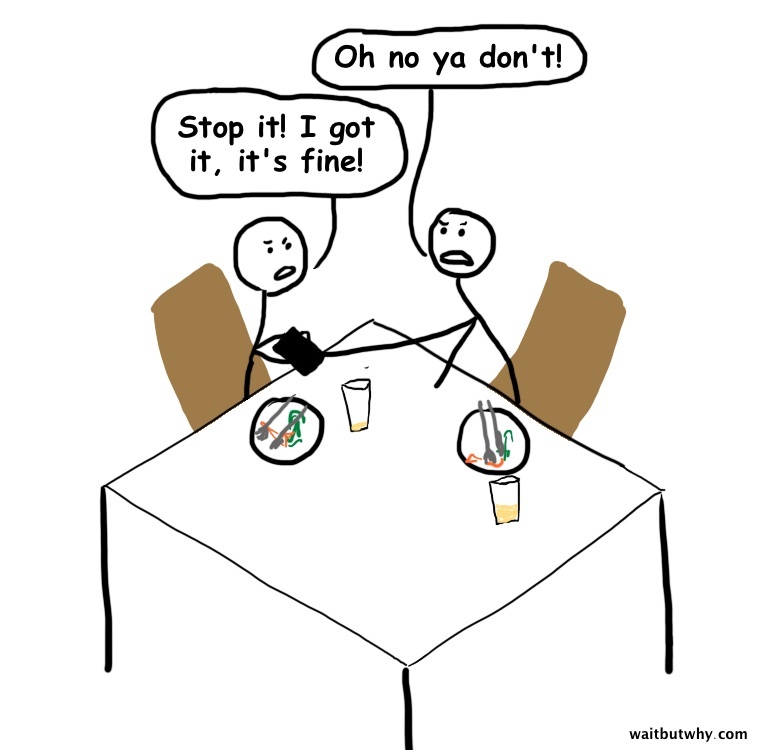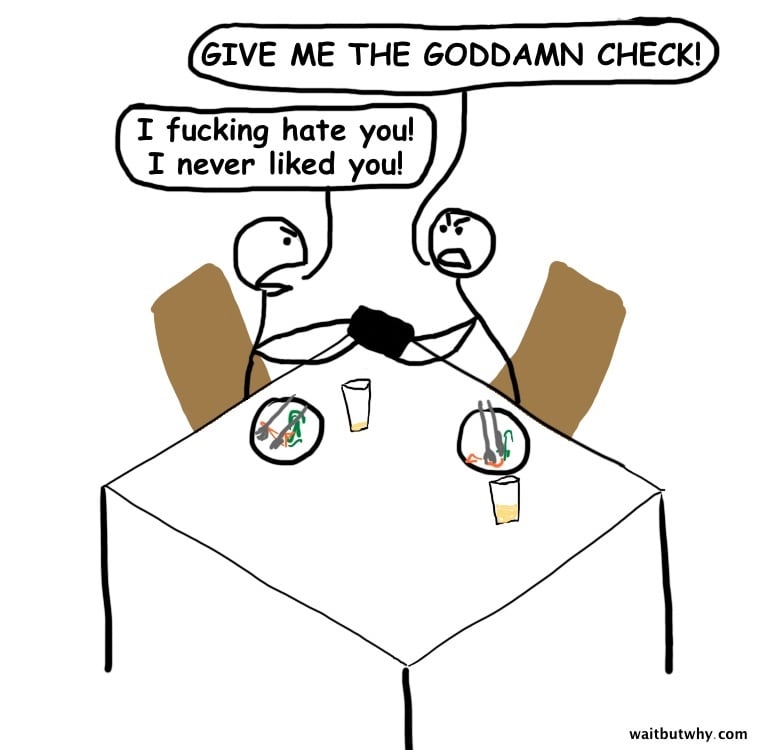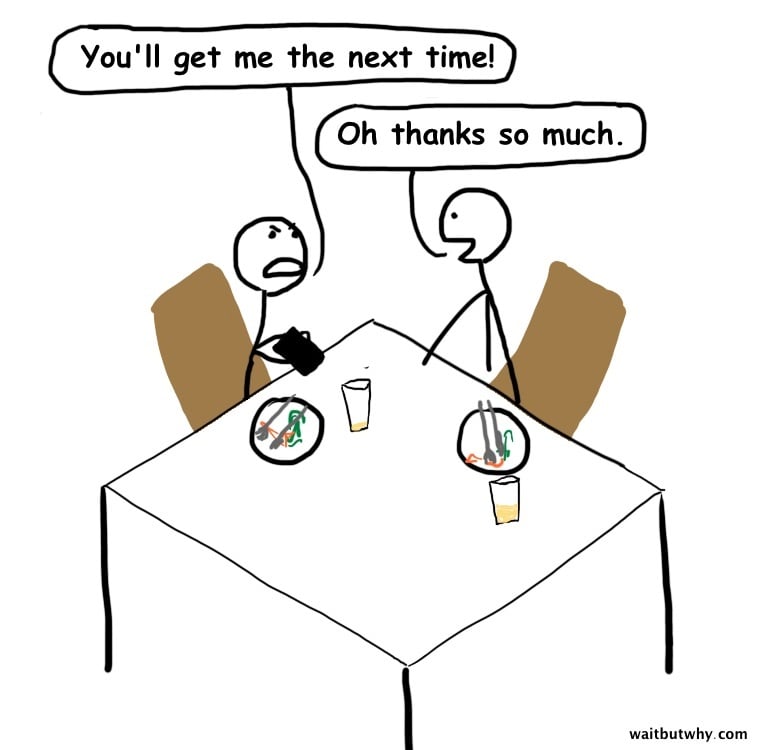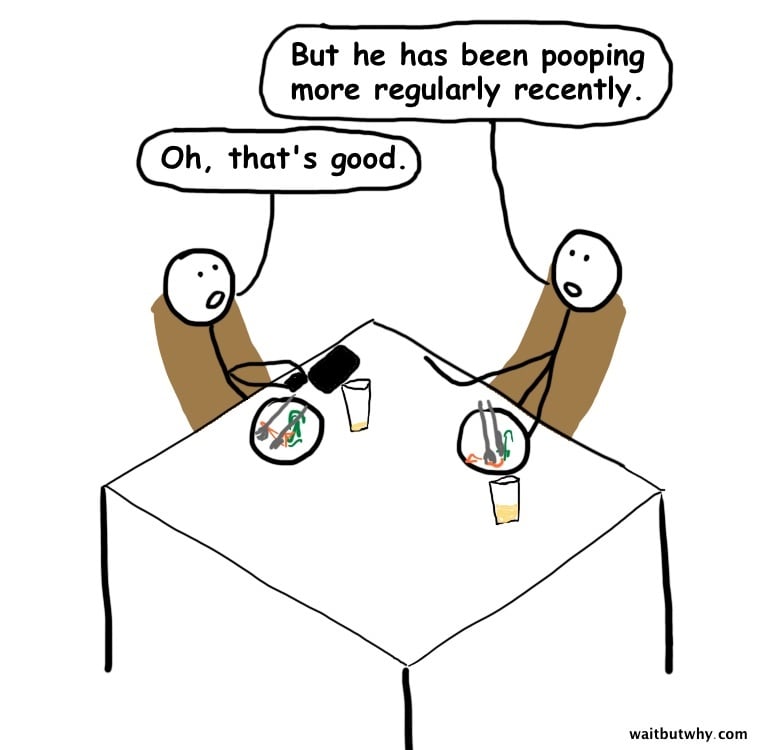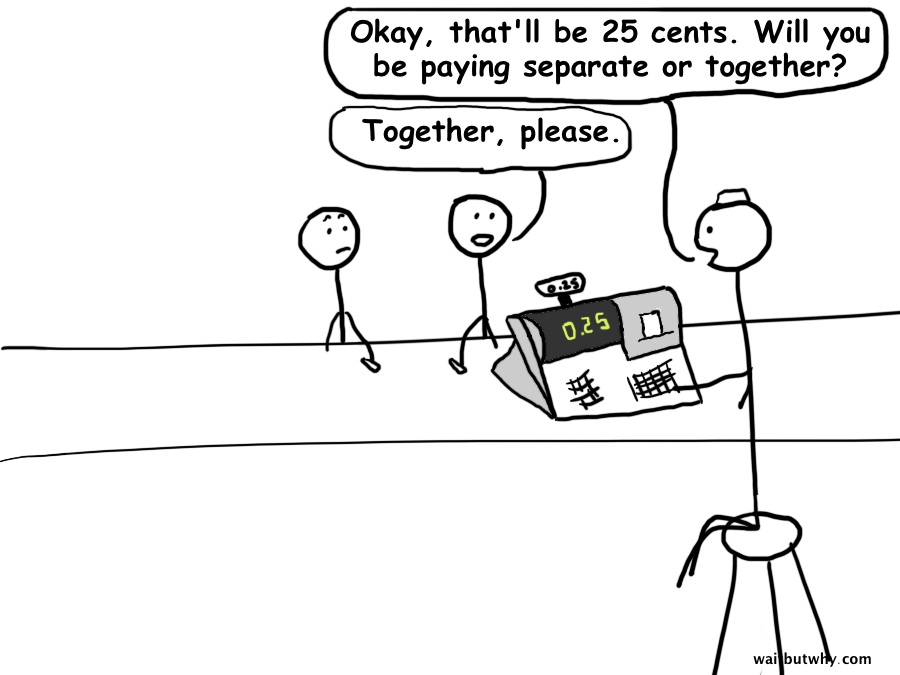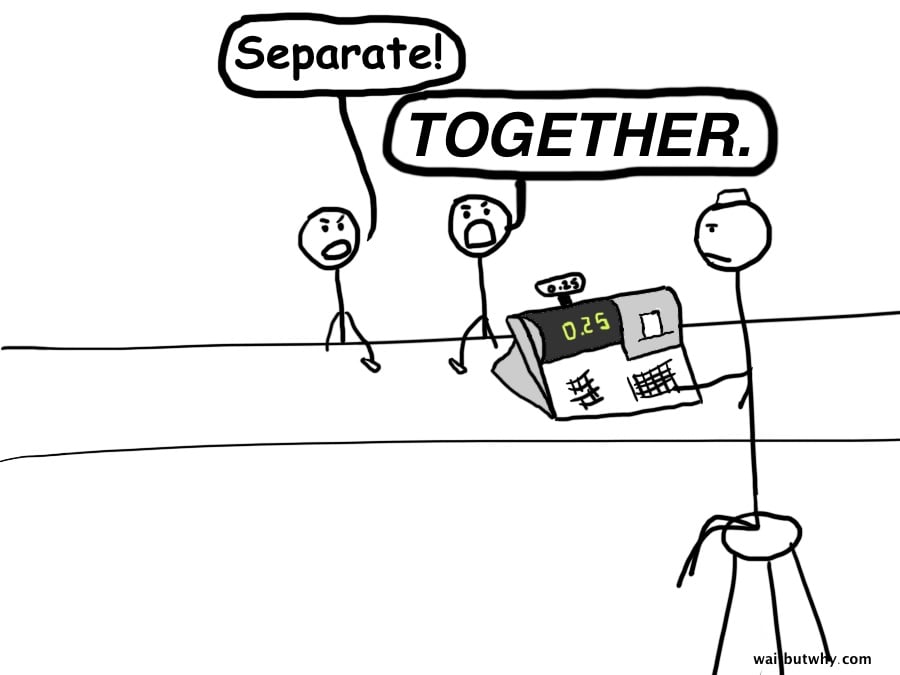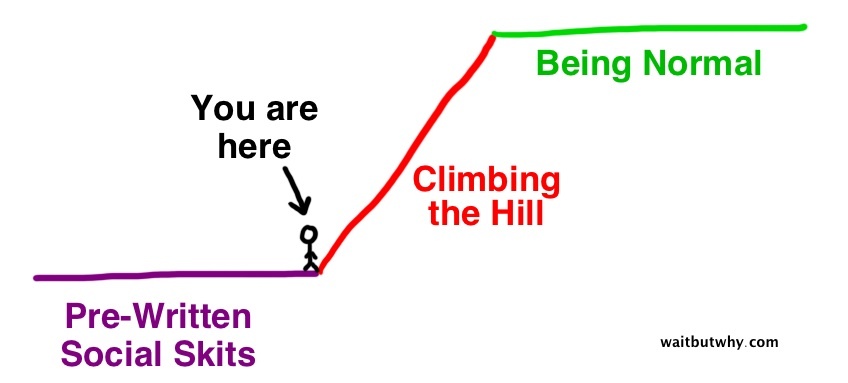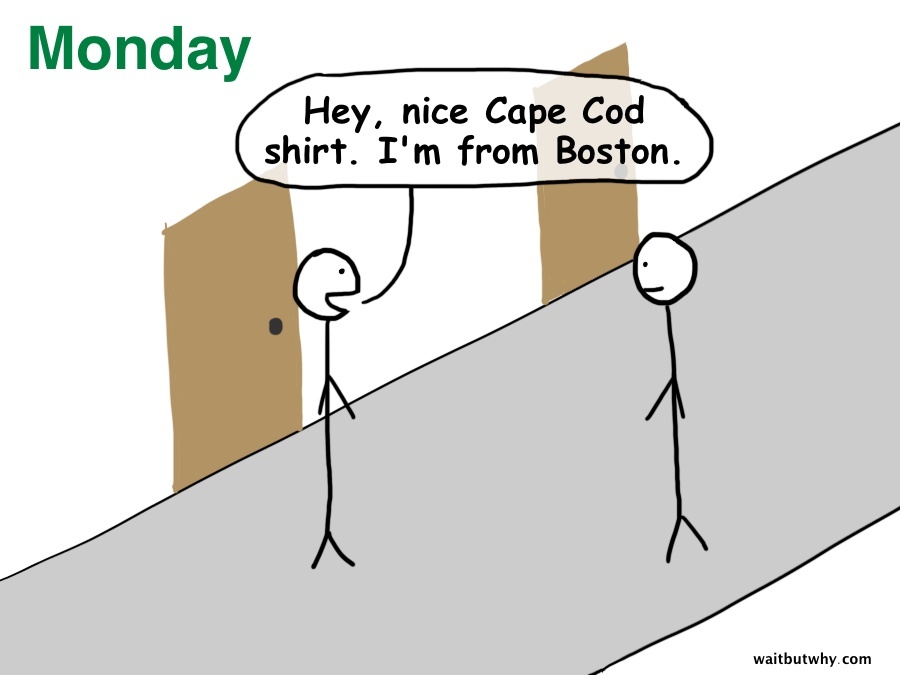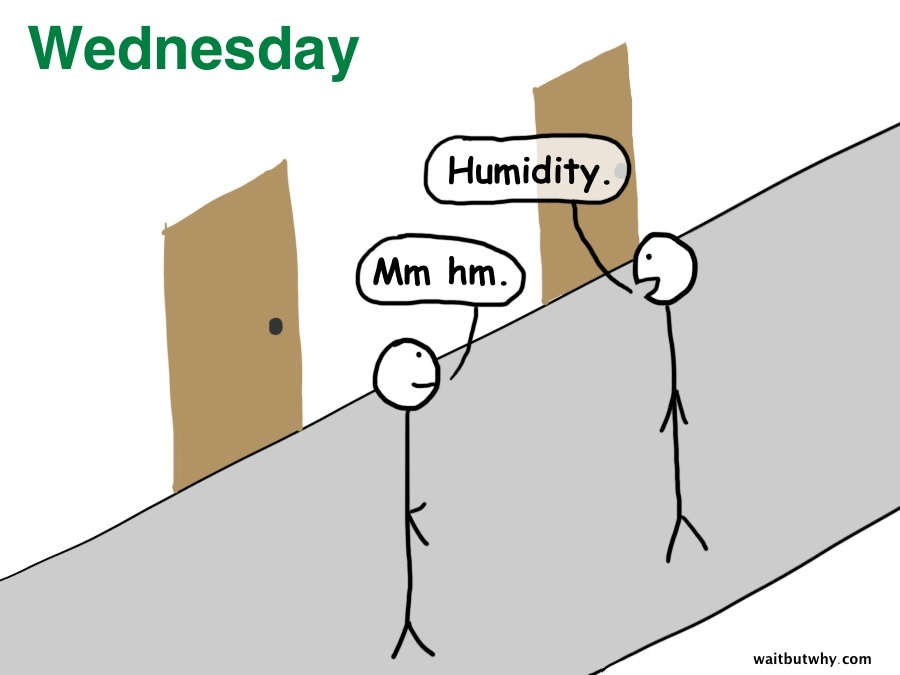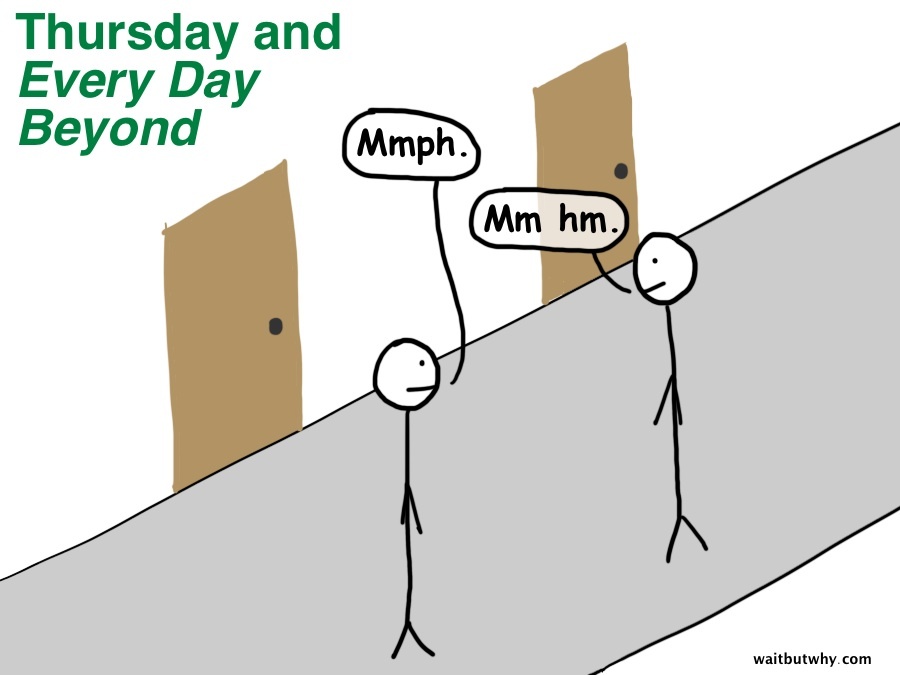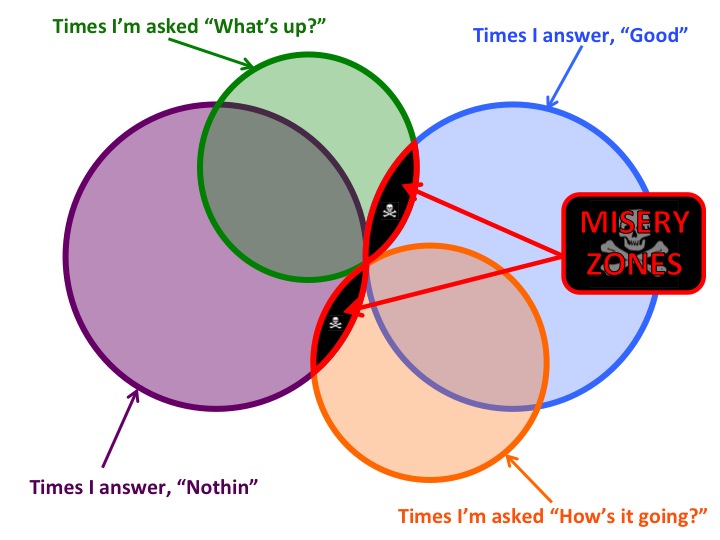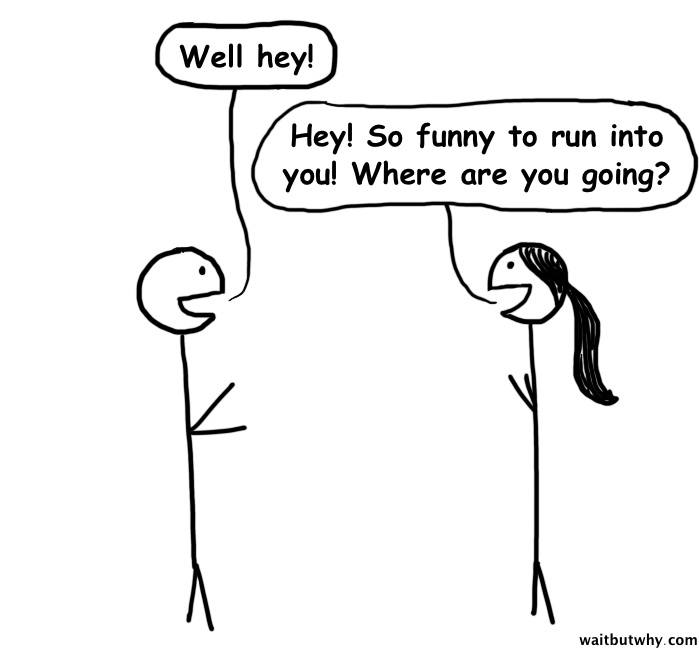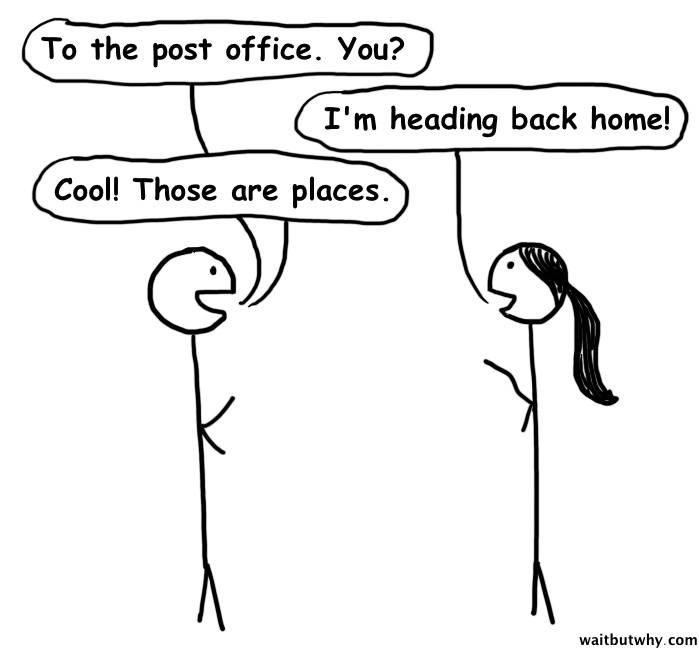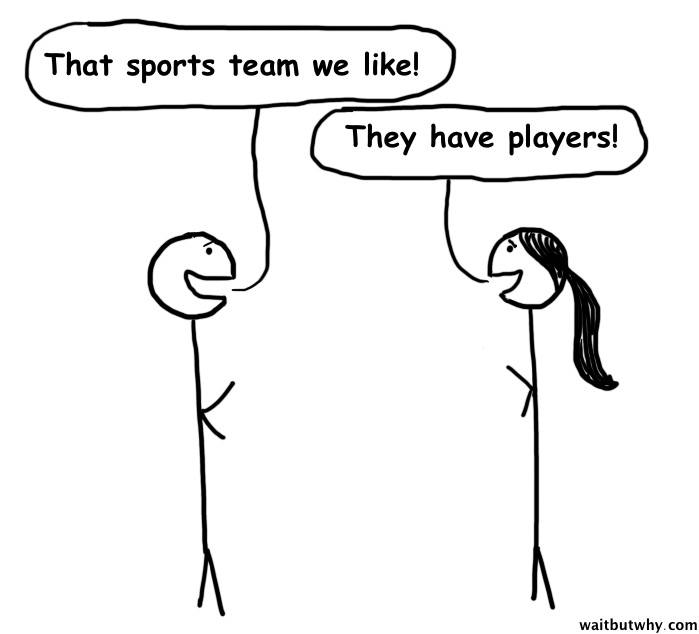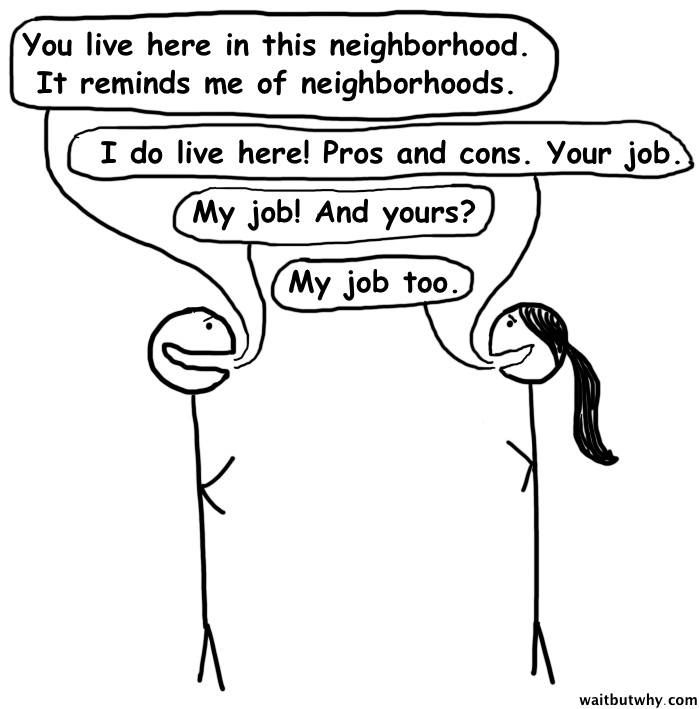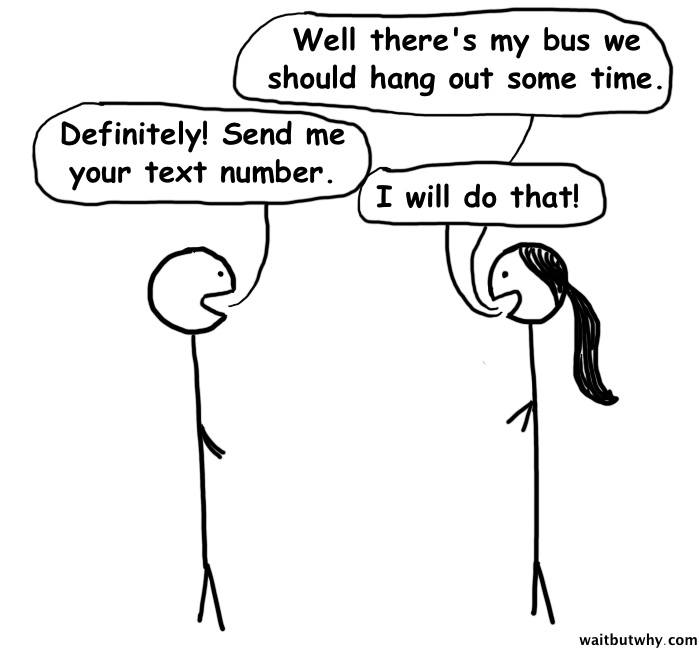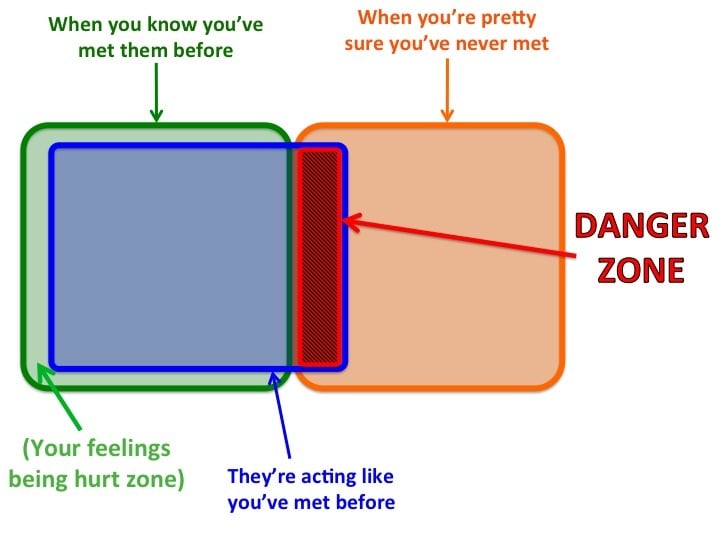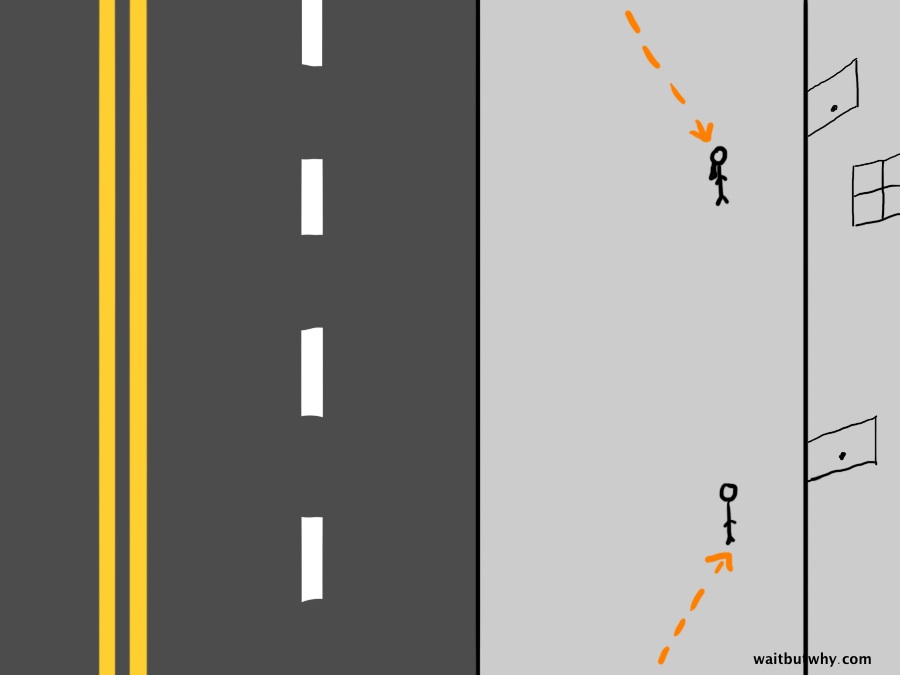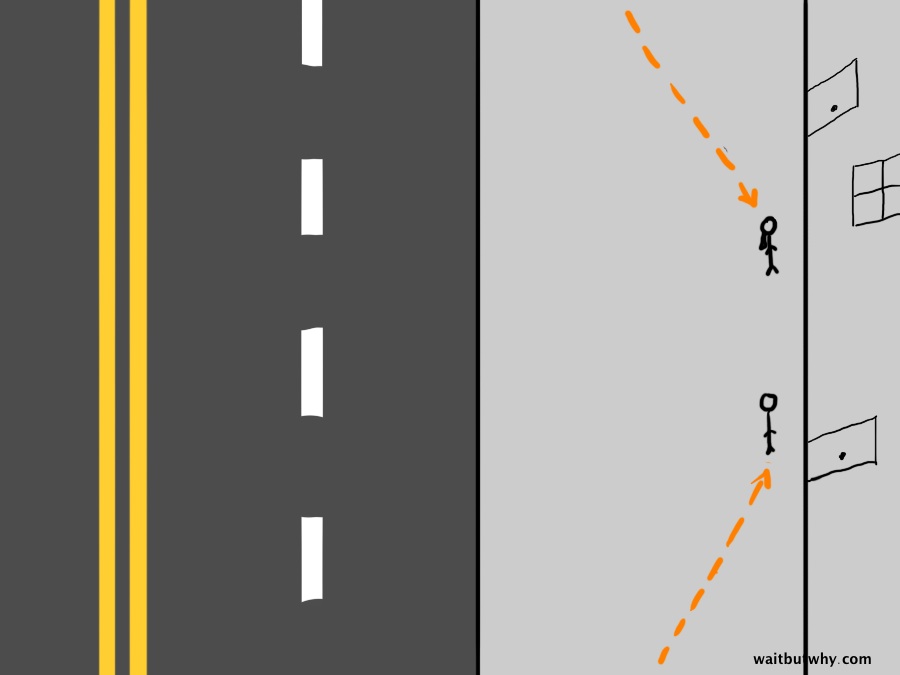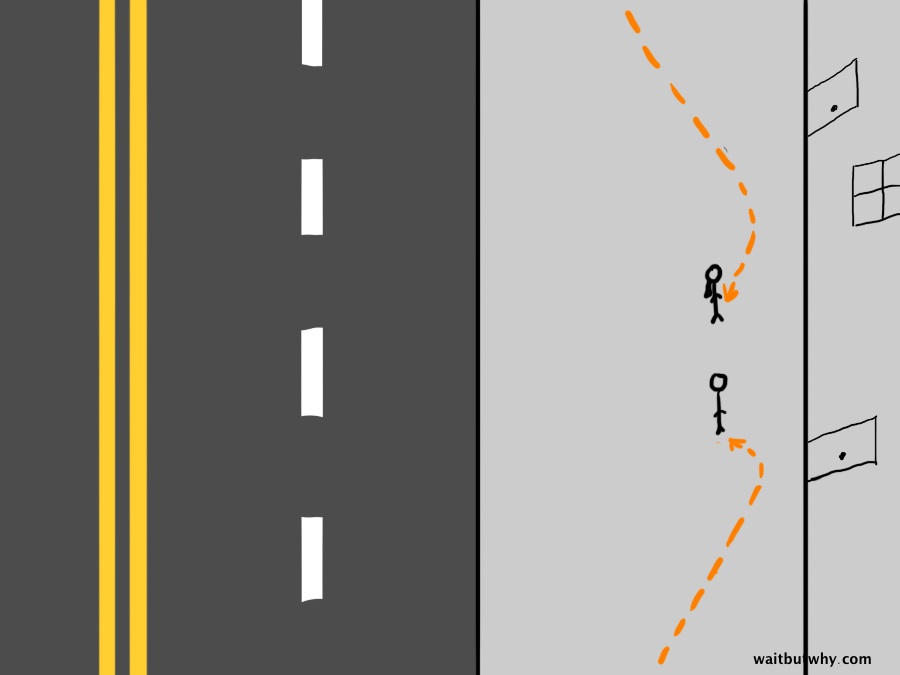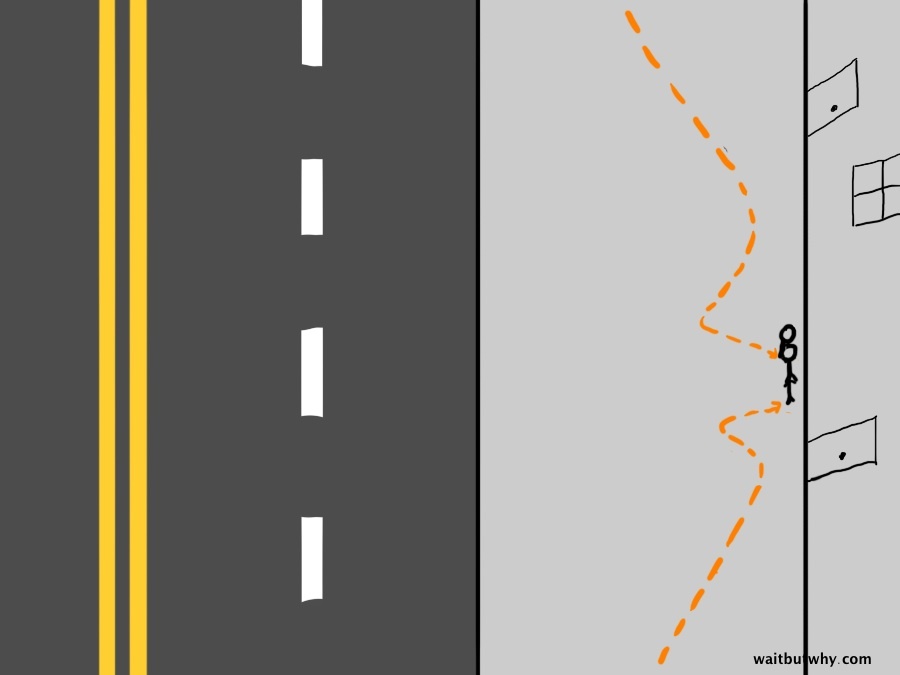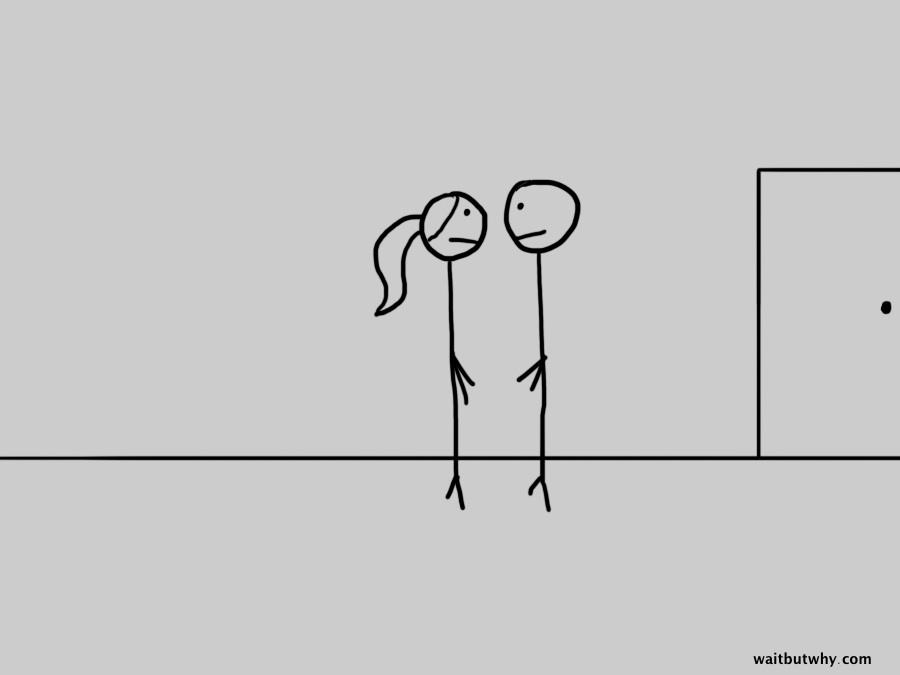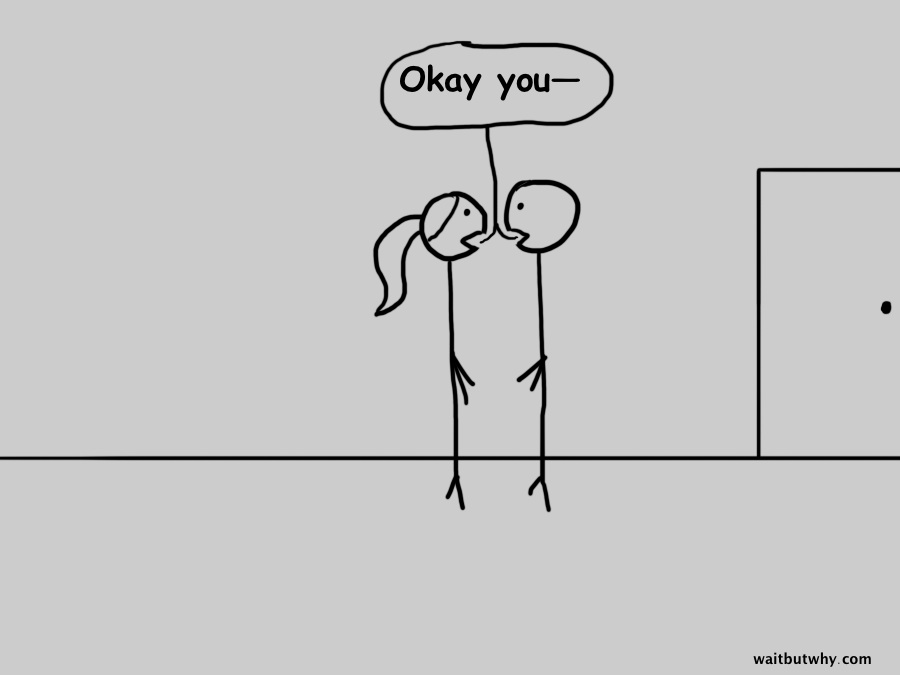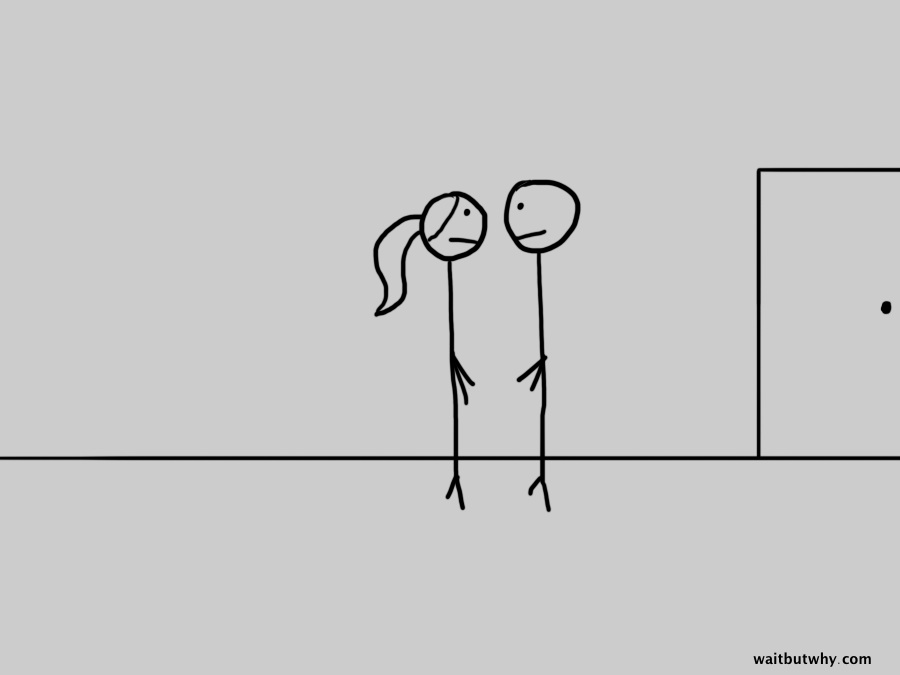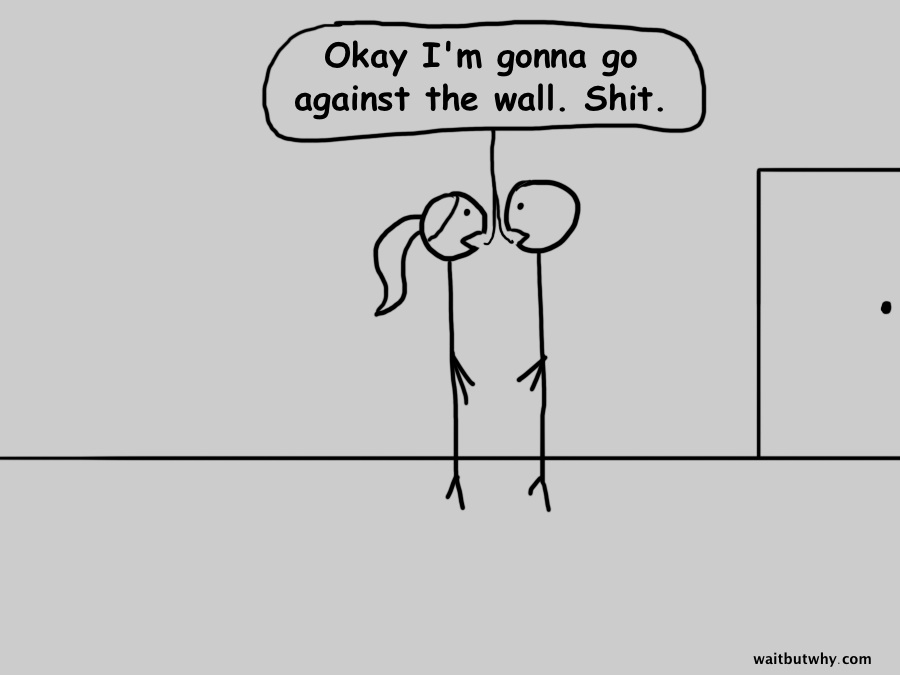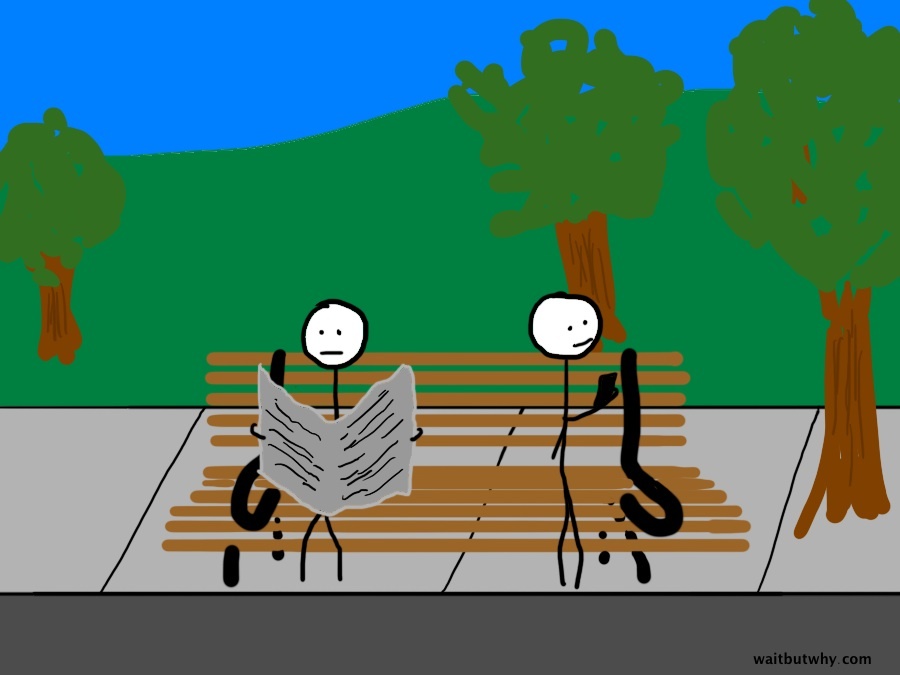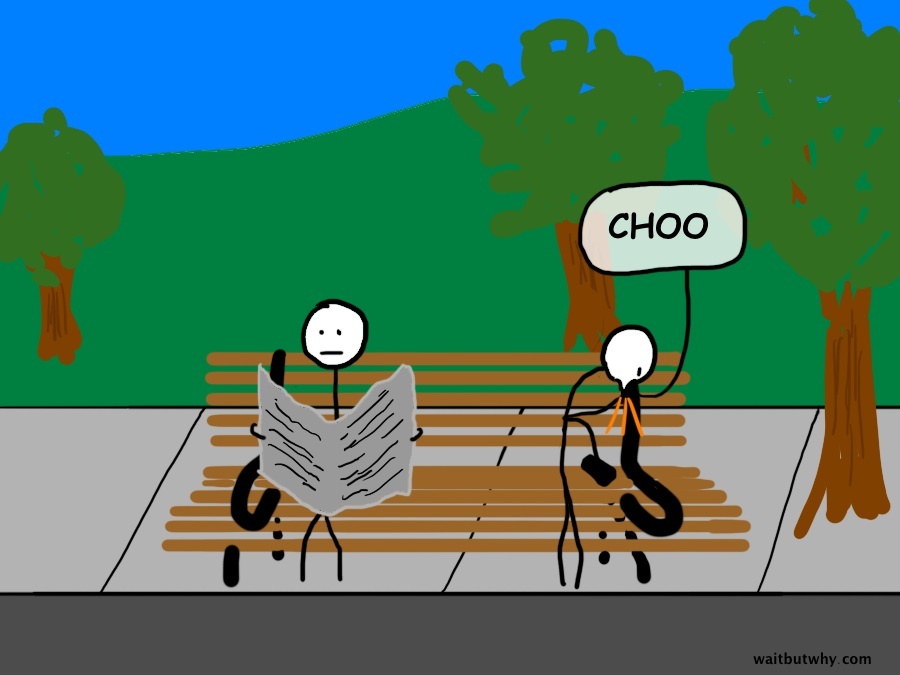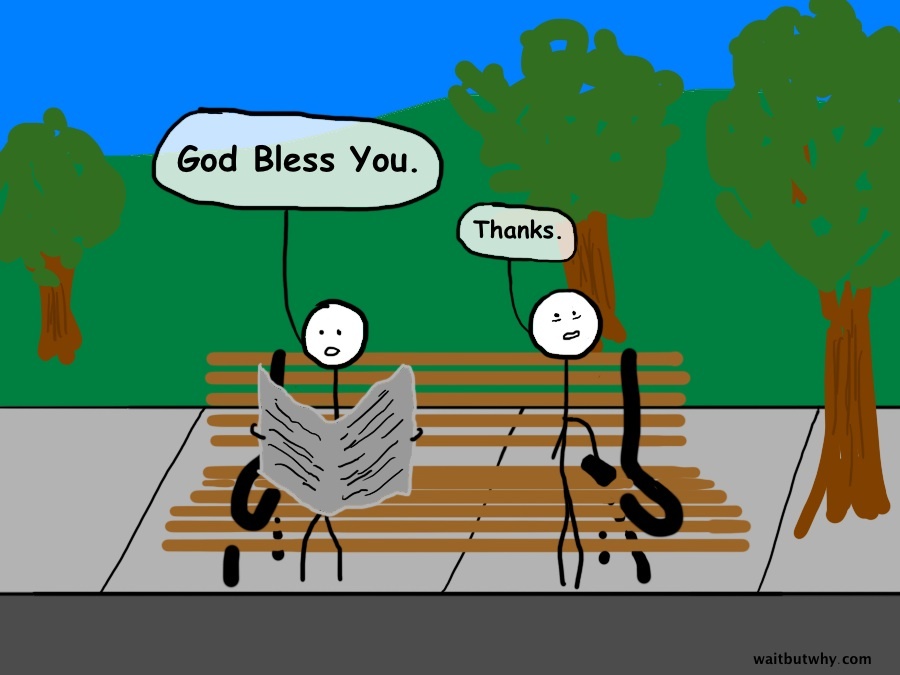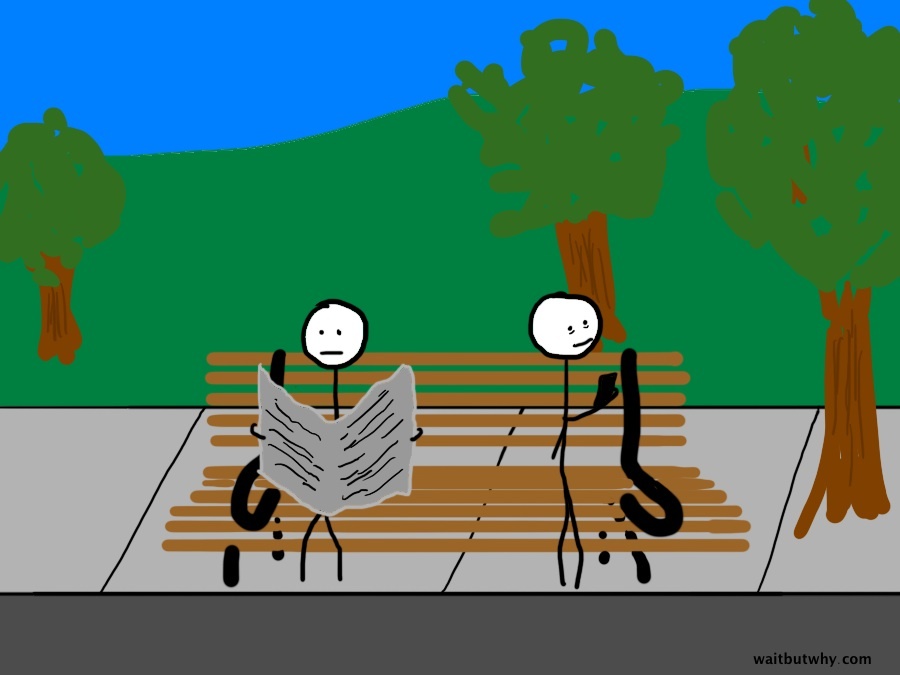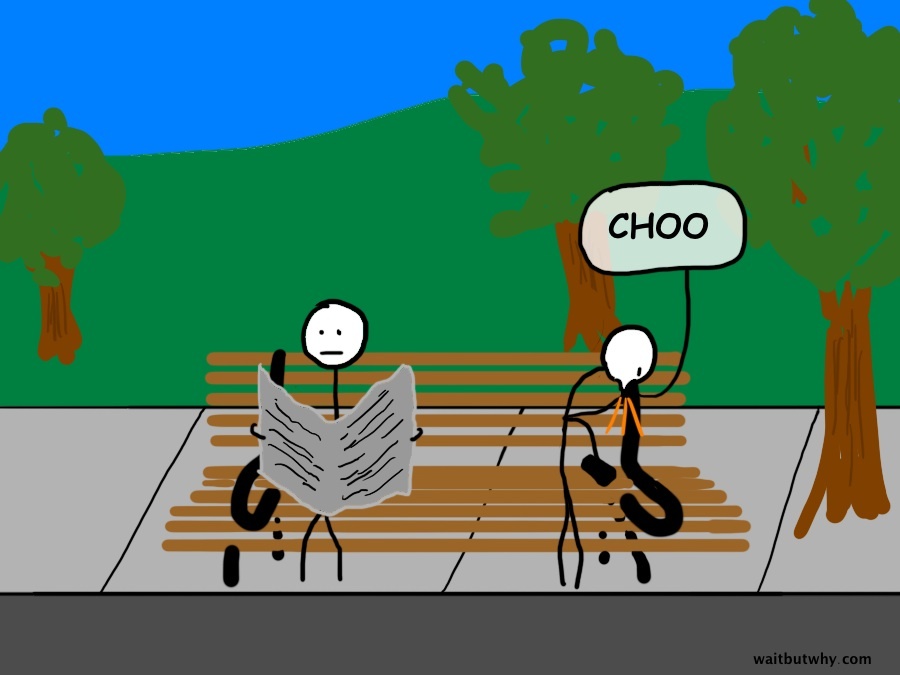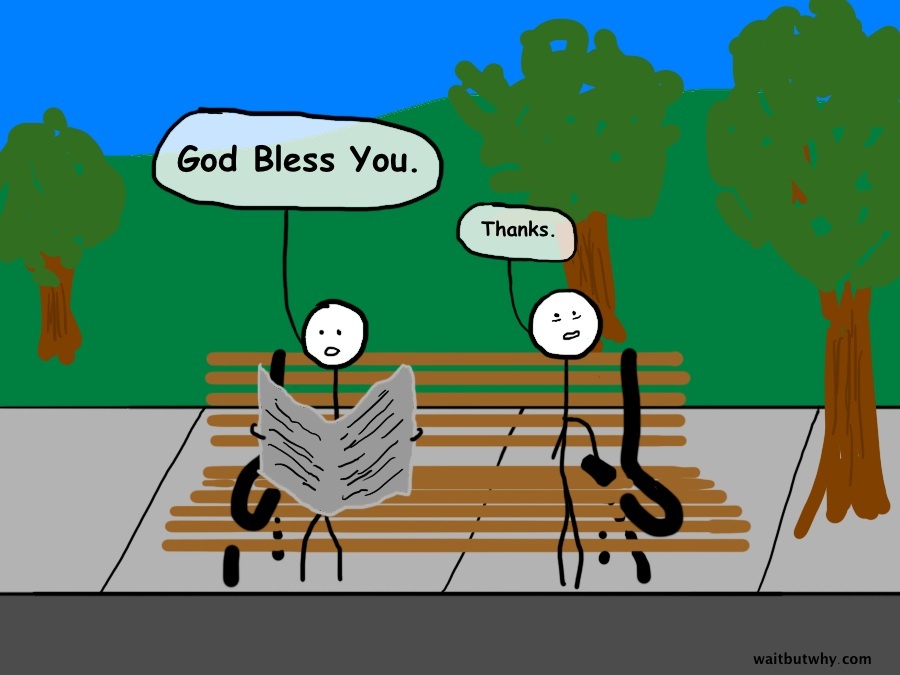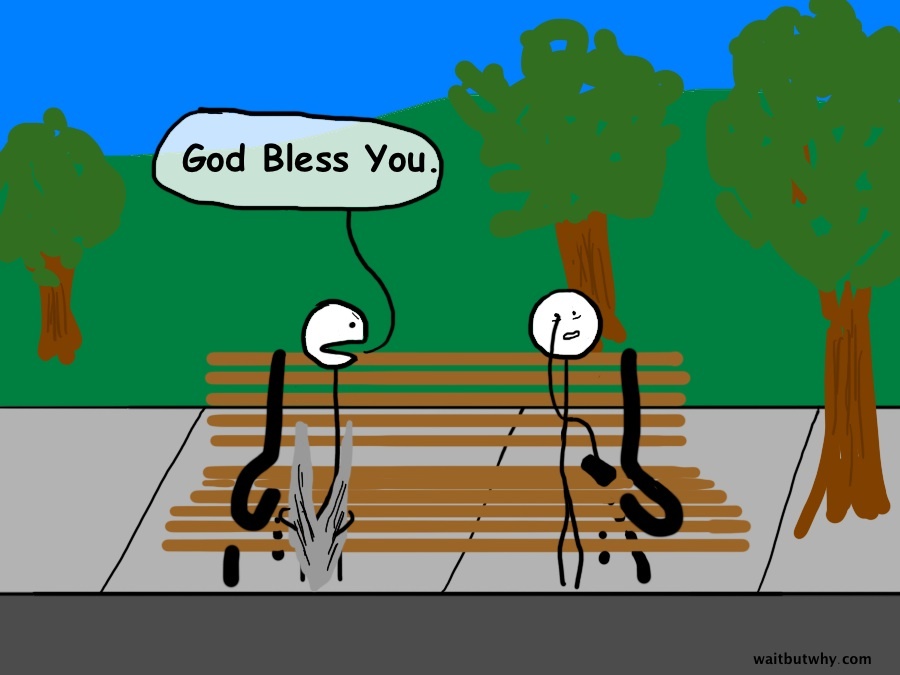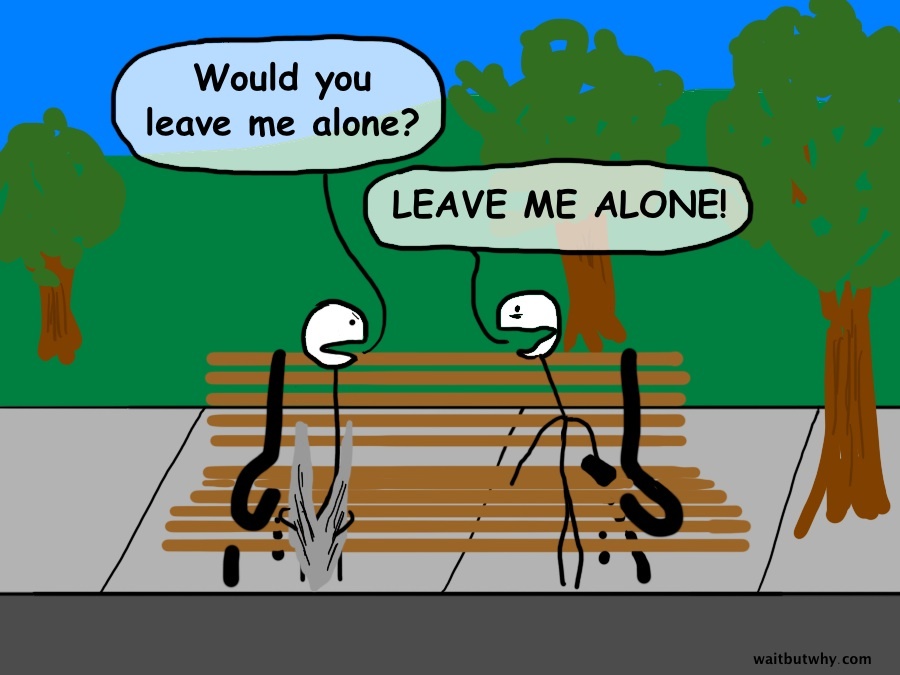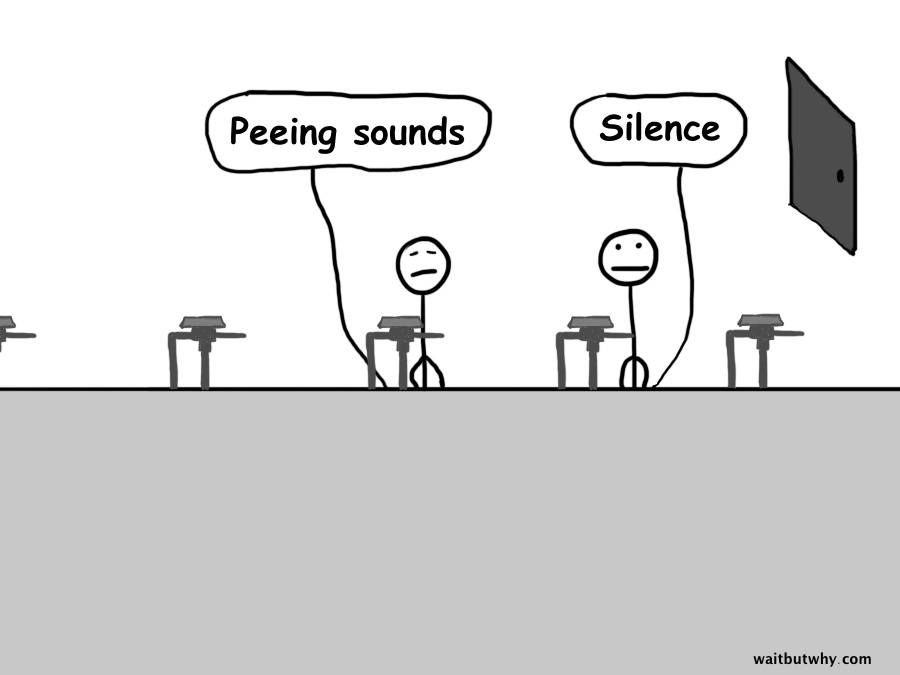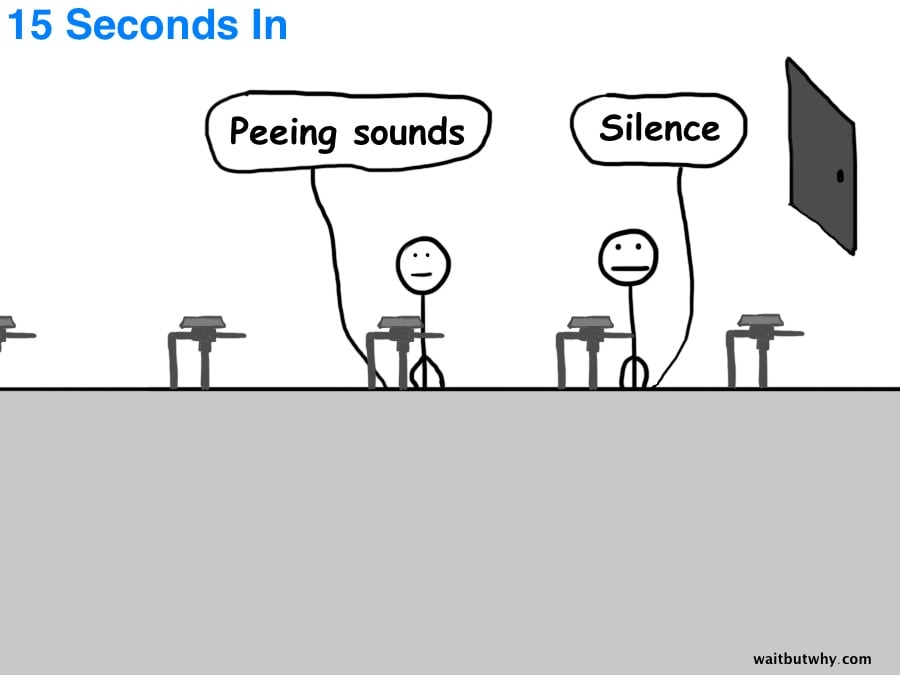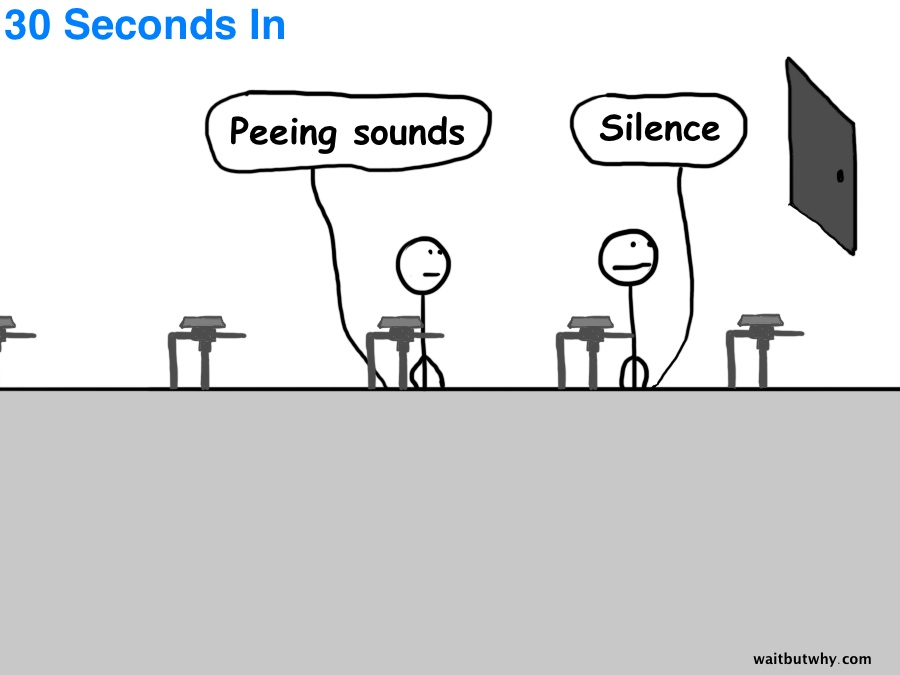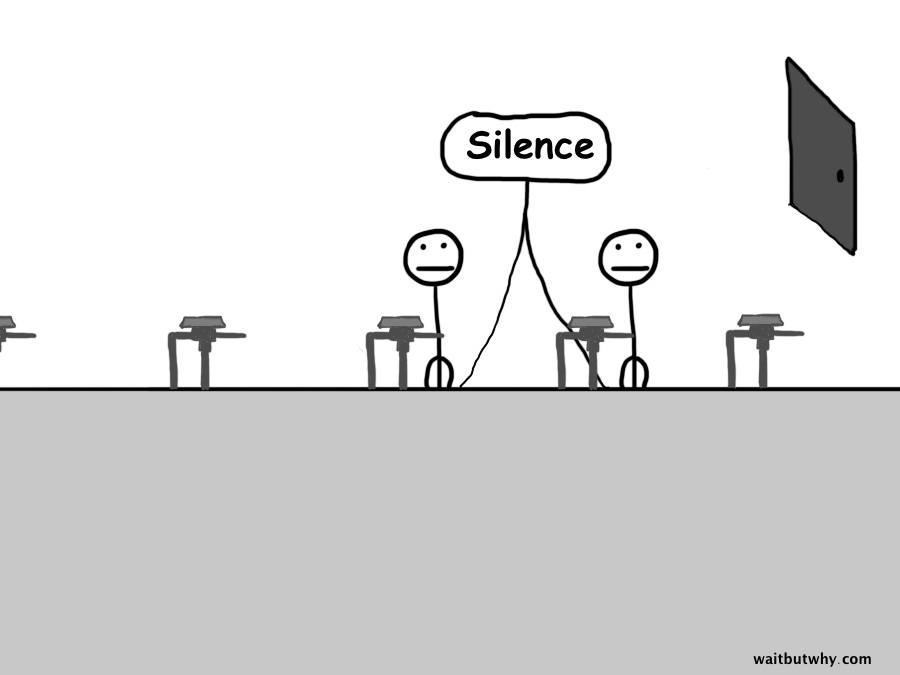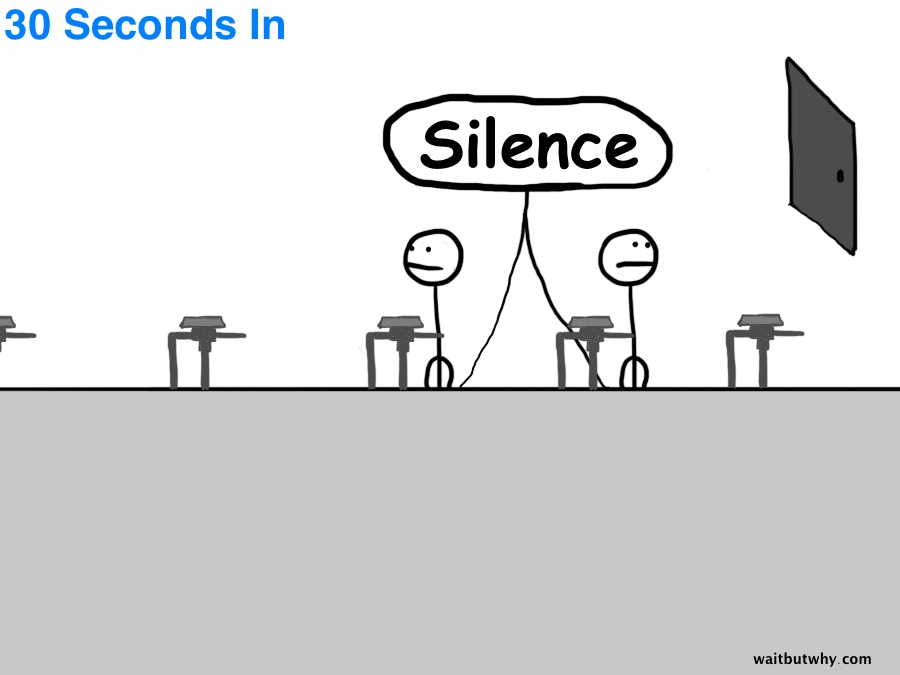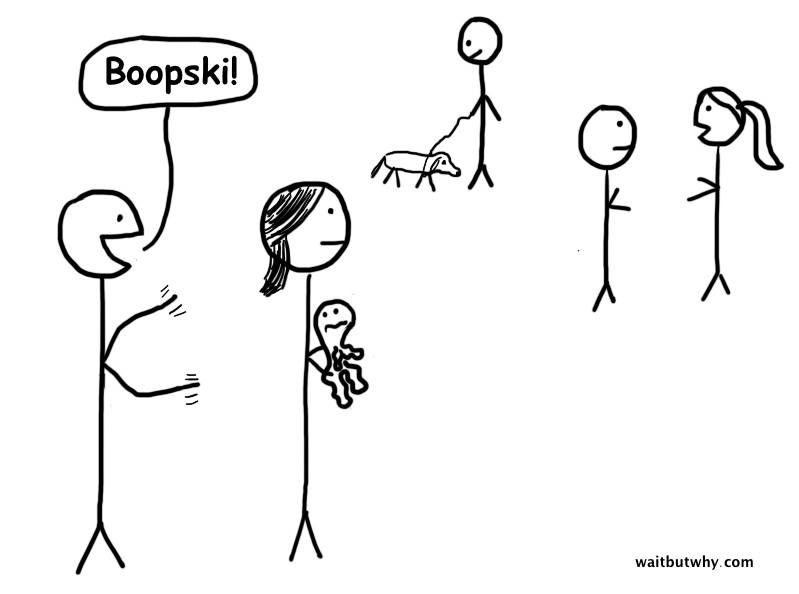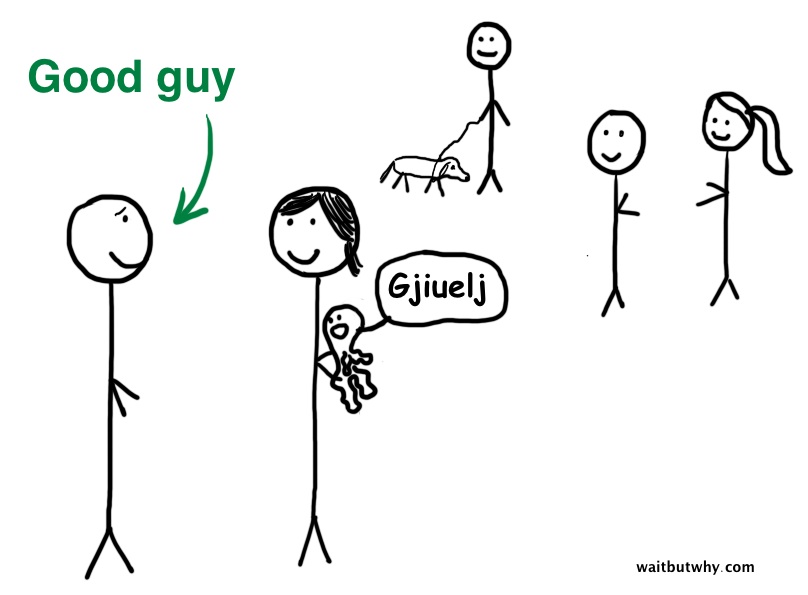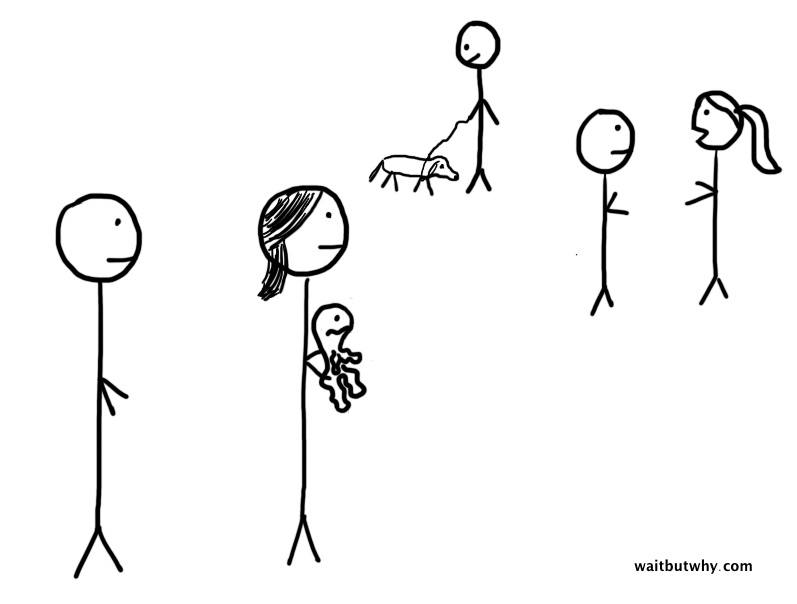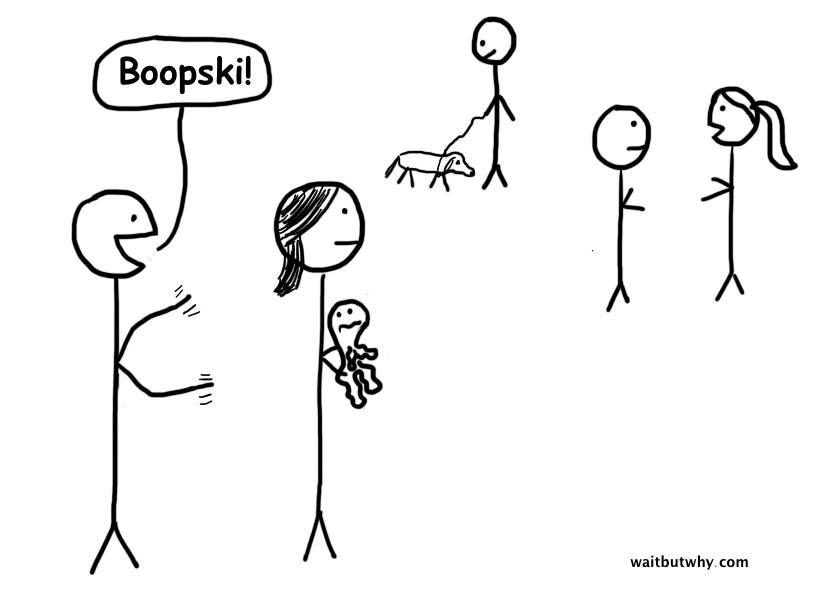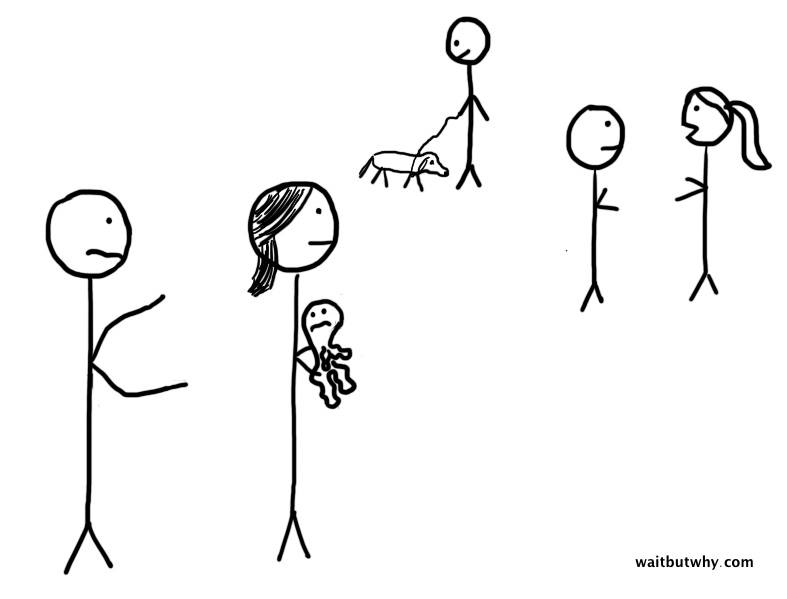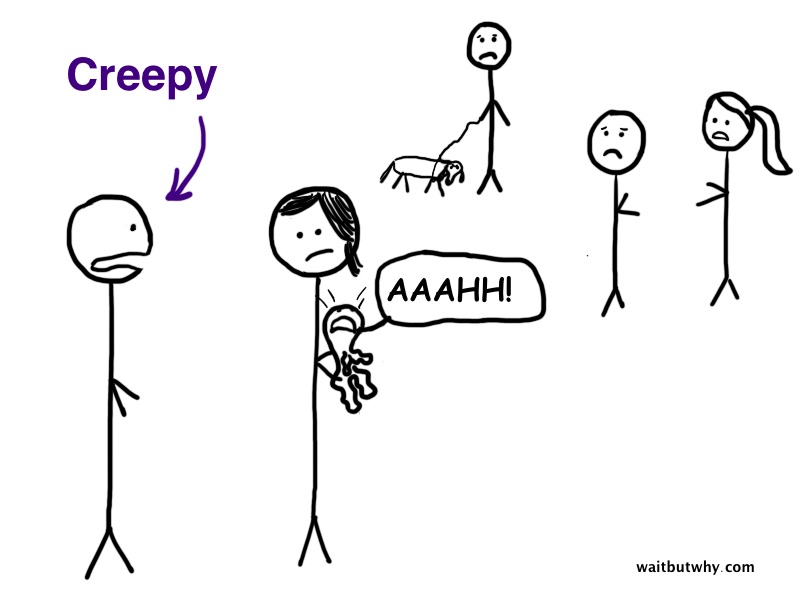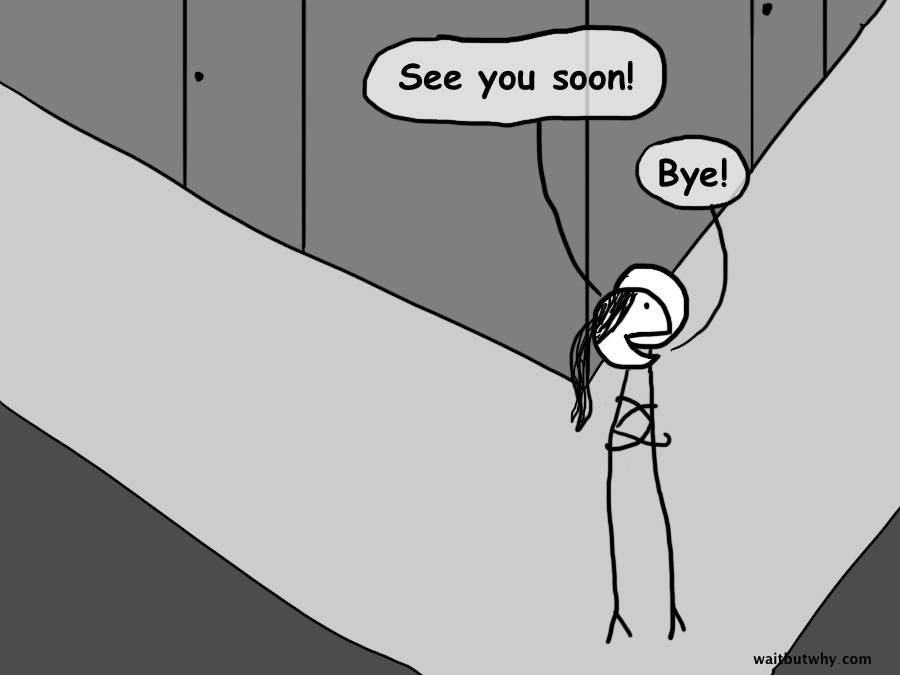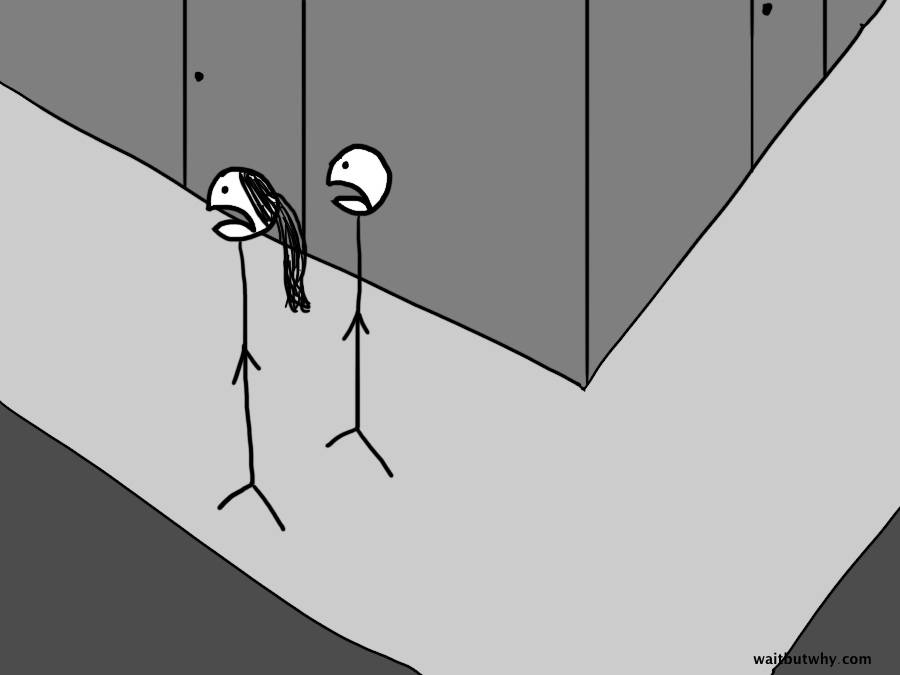If an alien ever immigrated to Earth, he’d be a social disaster. He’d try his hardest to learn by observing how humans behave, but it wouldn’t be easy—he’d see someone ask a stranger for a cigarette and he’d go ask for a sip of someone’s latte. He’d see a couple kissing on the street and he’d go try to kiss the policeman on the corner. He’d stare. He’d get food all over his alien face. And when he got tired, he’d lie down on the sidewalk. Our alien immigrant wouldn’t last a day before being arrested. He wouldn’t be behaving correctly, and he’d quickly be forcefully removed from society. That’s the way things are—there is an intricate set of thousands of social rules, and we’re all sharply attuned to them. If we weren’t, we’d be sent away somewhere. Even being nearly perfect will get you into trouble—you can have 98% of the rules down cold, but that last 2% will leave you with a reputation of “rude” or “weird” or “creepy.” But the hardest part of trying to abide by the Social Rulebook is that it’s far from a perfect book. It’s a lot like the Constitution:
It takes you to a certain point but then leaves much up to interpretation There are parts that are outdated or badly thought-out and terribly in need of an Amendment And to further complicate things, every nation, ethnicity, culture, and subculture has its own unique version of the Rulebook
Unfortunately, in the world of social interaction, there’s no Supreme Court to interpret tricky situations, no legislature to amend bad rules, and no international law to help standardize things across cultures. It’s the wild west out there. So you’re welcome to head out into public, but before you do, I’ll sprinkle you with just a sampling of the perils you’ll face, as a final warning—
Perils of Interacting With Friends and Family
You’d think that friend and family interactions would be on the safer side, since those people are likely to be using mostly the same version of the Rulebook as you. The problem is, with those closest to you, an expectation of intimacy and comfort puts pressure on each interaction going well, your history together often leaves things highly charged, and since this is the arena where gossip and long-term memory live, the stakes are at their highest. Also, you’re probably kind of an awkward person and awkward people are never safe, no matter whom you’re with. When meeting up with a friend or family member, things can get tricky before they even start, with a potential 30-Second Hello:
And just when you’re relieved that that’s over, you’ll find yourself trying to pick a door in one of the great social struggles of our time, The Handshake/Hug Decision of Doom:
I’ll be 90 and I still won’t have figured this out. There are different rules for everyone and nothing’s clear—Do I shake my grandfather’s hand or go for the hug? How about my friend’s father? Old friend? New friend? Opposite-sex acquaintance? Longtime work colleague? Sibling’s good friend who I’m meeting for the second time? It’s unbelievably complicated. And there aren’t just two options you’re choosing from—there’s the high school bro handshake/backslap douche possibility, there’s the vertical, loose-hand high-five that morphs into a weird springy-finger tension thing as you snap away, there’s even the easy but taking-yourself-really-seriously non-ironic fist pound. And even if you both go for the hug, there’s a question of duration and firmness and who’s in charge of those decisions. (Hugs are a weird concept, by the way. There are a large handful of people in my life I hug tightly every time I say hi or goodbye to them who I would never in any other circumstances touch that intimately. It kind of makes no sense. Whoever wrote the Social Rulebook didn’t really think that hard about it.) Anyway, just when this couldn’t get any harder, somewhere along the line, society decided it was a good idea to bring kisses into the mix. Kisses were doing just fine in the romantic and parent-child arenas, and it’s unclear why kisses have any part in any other situation. Unless it’s specifically part of your culture, no one under the age of 18 kisses people when they greet them, and as you move into the adult world, you’re just expected to figure out when to kiss people during a greeting. And there are multiple versions of kiss too—the light cheek kiss, the near-cheek air kiss, the absurdly drawn-out one-kiss-on-each-cheek-as-if-we’re-an-Arabian-prince skit—all further complicating the situation and putting us in deep peril of the dreaded Accidental Mouth Kiss:
After surviving the greeting, some close friends continue to show affection, which leads to more trouble, such as The “Wait How Do We Stop Doing This” Physical Contact Situation. I often end up resorting to making up a drastic thing I need to do with my arms.
And all of this is nothing compared to The Money-Related Song and Dance. There’s the obvious:
But friends can break into a Money-Related Song and Dance almost anytime, anywhere:
And it’s not just limited to transactions. At some point between the ages of 22 and 40, it goes from being totally okay to discuss your income, price of rent, and general financial situation with friends to not really okay at all. And we all have to figure out how to make that transition.
Perils of Interacting With Acquaintances
An acquaintance is someone you know, but you don’t hang out with them socially, and if you ever did, it would only be as part of a large group of people. It could be someone you went to high school with but were never friends with, someone who lived down the hall from you in college for a year, a friend of someone you know, or someone you work with or used to work with but you don’t know very well. Most of the time you’re with friends, things are fine—the awkward parts are the exception to the rule. But with acquaintances, awkwardness is the rule. My theory is that the word “acquaintances” is derived from the word “awkward” to mean “people you’re awkward with” and was originally spelled “awkwaintances,” but then they changed the spelling to try to make things less awkward. Here’s the issue—there are three ways to converse with someone:
- Pre-Written Social Skits—You do this when you’re not trying to get to know someone better but you’re also scared to just act normally around them.
- Climbing the Hill—Trying to get to know someone better or to catch up on their life.
- Being Normal—Accepting the state of a relationship and just enjoying whatever you can from each other’s company. In general, the main thing that makes interactions awkward is inauthenticity. Authentic is the enemy of awkwardness, and with acquaintances, the only two authentic options are #3 or, if you really do want to advance the relationship into friendship territory, #2. Since usually, neither party actually wants or plans to become better friends, we’re left with “Being Normal” as the key to acquaintance interaction. But here’s where we run into trouble. This is how most people see these three above types of interaction:
But that assumes that you can only be normal around someone you know well, which is not true. I started using a new barber last year, and I was pleasantly surprised when instead of making small talk or asking me questions about my life, he just started talking to me like I was his friend or involving me in his conversations with the other barber. By doing so, he spared both of us the massive inauthenticity of a typical barber-customer relationship and I actually enjoy going there now. He doesn’t go by the above graph, but rather, sees things more like three doors that you can choose from:
You’re not required to either smalltalk or pretend to want to get to know someone—it’s a choice to do either and you can choose “Be Normal” instead. Unfortunately, the Social Rulebook doesn’t talk about being normal with acquaintances, only a bunch of chapters about how to survive the terror of an acquaintance interaction, authentic or not. We badly need to make a Rulebook amendment here—until we do, my barber relationship will be a rare one. For now, we’re stuck with things like The Work Acquaintance Trap, which happens when two people who are acquaintances by circumstance and have to see each other every day make the short-sighted mistake of sacrificing what had been the peace of an authentic non-relationship for the hell of a permanently-stuck-in-#1 cycle:
Because conversation type #1 involves a large number of pre-written-by-society, canned Robot Phrases, The Work Acquaintance Trap also leaves you at great risk of a Robot Phrase Mismatch:
Even worse is running into an acquaintance in public. Both people are typically so petrified by the awkward-potential that they end up acting insane. And it can go on for a hideously long time if anyone makes the grave error of asking about the other’s life, leading to The Everlasting Acquaintance Run-In:
Perils of Interacting With Strangers
Interacting with strangers is another way of saying “interacting with the rest of your species,” and it’s often uncomfortable. Even though unlike the former two categories, nothing real is at stake (other than your dignity), stranger interactions can provide some of the most awkward moments in life. Introductions are awkward by nature, and they’re severely complicated if you’re not entirely sure of whether the person you’re introducing yourself to is actually a stranger. The main way to get yourself into trouble is having a bad memory for whom you’ve met before, which can lead to a Nice to Meet You / Nice to See You Disaster:
Then, of course, there’s The Sidewalk Direction-Mirroring Quagmire:
One of the most asinine and outdated clauses in the Social Rulebook states that despite having zero relationship with me whatsoever, a nearby stranger must vocally command God to save me if I inhale some pollen. The Inexplicable Sneeze Standoff is possibly the single most awkward part of my life, especially since I’m a Multiple Sneezer.
Men also deal with a whole pile of stranger awkwardness in the urinal arena. This might just be a weird issue I have, but at some point, I become incapable of peeing if there’s some pressure to pee and I start to think too hard about it. Being next to one other person at the urinal in an otherwise-silent bathroom usually does the trick:
In the rare circumstances that the other person next to me is a weird neurotic person too, we run the horrifying risk of a Silent Urinal Standoff Nightmare:
Considering all of the hazards out there in the world, you’d think at least an interaction with a not-yet-sentient blob would be safe. Think again. Interacting with stranger babies in public is a high-stakes endeavor—if they respond well to you, you’re the most charming person in the room and everyone is suddenly smiling at you and wants to marry you. It goes like this:
The baby acted like a reasonable person and everything went well. But the problem is, a large percentage of babies are bad, and you never know who’s who. Nothing will make you look and feel like a big weirdo quicker than a baby reacting badly to you. Beware The Bad Baby:
It’s a tough world out there. And just when you’ve had enough and you’re heading home to safety, you’ll likely say goodbye to whomever you’re with before realizing you’re about to embark together on a Same Walking Direction Post-Goodbye Walk:
If you liked this article, subscribe by email to have Wait But Why’s once-a-week posts sent to you by email. Never any spam. Visit Wait But Why: www.waitbutwhy.com Follow Wait But Why on Facebook: www.facebook.com/waitbutwhy Follow Wait But Why on Twitter: www.twitter.com/waitbutwhy
